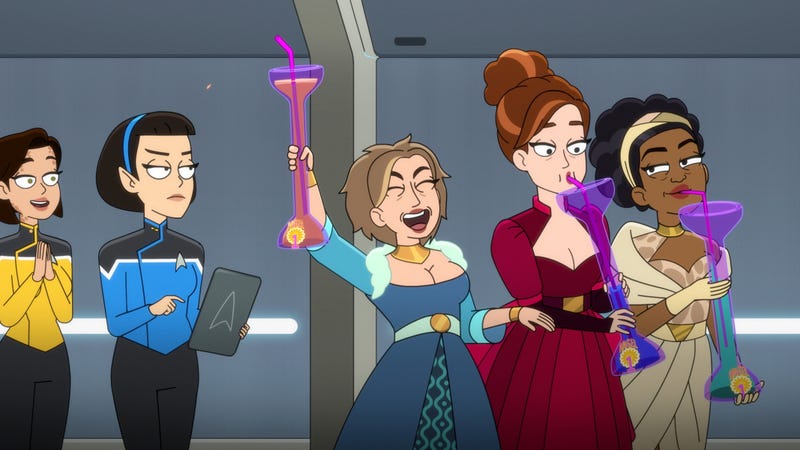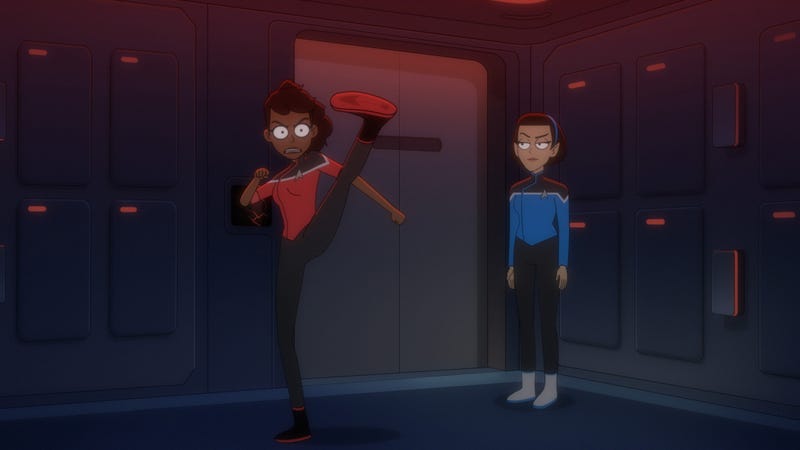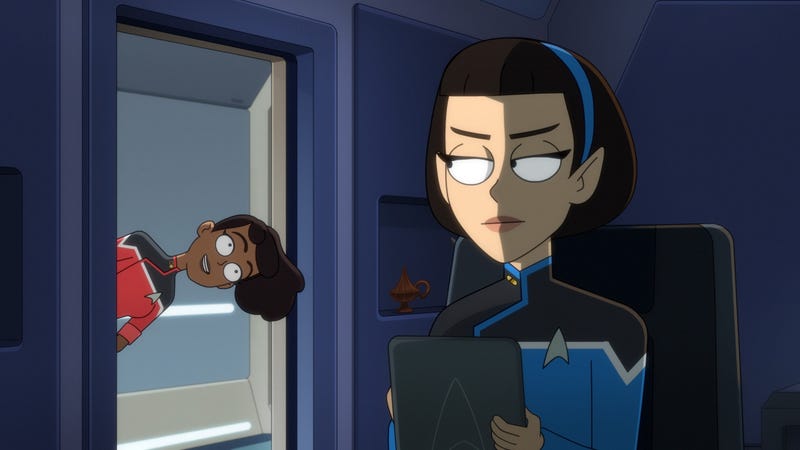
The last time Lower Decks truly surprised me was in season two’s remarkable tri-perspective episode “wej Duj,” a compelling experimental story that examined the plights of lower deckers across all sorts of Star Trek vessels, not just Starfleet. It’s fitting then perhaps that in surprising me this week, it does so by making that episode’s breakout star the focus.

It only took all of season three, but when former Vulcan High Command officer, now turned fellow Starfleet Lieutenant (Junior Grade) T’Lyn, joined the main cast on this season of Lower Decks, it provided a great breath of fresh air for the main cast. So far in season four, she’s largely acted as a straight-laced foil to our already familiar heroes, effortlessly sliding into the cast and bouncing off them in some interesting ways. But this week’s episode, “Empathological Fallacies,” puts T’Lyn in the spotlight for an episode about defying the expectations put upon yourself—and in doing so, Lower Decks arguably lands one of the best, if not its best, episodes since “wej Duj.”

“Fallacies” splits this message across three plots. In the primary, the Cerritos plays begrudging host to a trio of older Betazoid women, making their way to the planet Risa for a girl’s trip that even the iconic Lwaxana Troi would envy. At first, this plays like a riff on Deanna’s legendary mother and her appearances in Next Generation and DS9—if one Lwaxana was too much, what about three at once! Those parallels only become clearer when the Cerritos crew finds its emotional inhibitions out of whack, assuming that the party-crazy Betazed dames are responsible with a case of the telepathic syndrome Zanthi fever, evoking Lwaxana’s touching appearance in the DS9 episode “Fascination.” That dovetails nicely into the second plot, where T’Lyn’s focus comes in, where it’s up to her and Mariner to solve the problem of the crew getting emotionally turned upside down, on the assumption that Vulcan logic and reason will be able to triumph over all this emotional chaos. And then, beneath all that, Boimler finds himself assigned with Shax and the security crew for a shift and is begrudgingly forced to go through the team’s bonding rituals—from slam poetry night to Enterprise puzzle parties—instead of the gung-ho action and brute force he expected of Shax and his team.
All these are set up to play on established Trek tropes and with the audience’s assumptions. Who else could be causing the emotional turmoil aboard the Cerritos than these goofy, party-mad Betazoid women, isn’t that what they’re all like? Who else can stop them other than the cold Vulcan logic T’Lyn embodies as the season’s straight-woman, isn’t that what they’re all like? Shouldn’t Boimler be running phaser drills with security squad meatheads, isn’t that what they’re all like?

“Empathological Fallacies” tees up all these expectations and then masterfully defies them all in one fell swoop, tying the three arcs together as T’Lyn—delightfully paired with Mariner here, but letting Mariner play into her rarely-leveraged supportive strengths, instead of being the absorber of Main Character Energy—cracks what’s actually going on. Admittedly Boimler’s arc, given that it’s the C-plot of a pretty packed episode, is the most surface level of all these—although Shax’s belief that Starfleet Security isn’t just about policing martial safety, but safeguarding the crew’s emotional safety as well, is a nice twist on the expectations of the division. But “Fallacies” excels in tying T’Lyn’s story and the Betazed’s story together with one simple, perfect twist: the Betazoids don’t have Zanthi Fever, and they’re not wild sex-mad party goers. Instead, they’re undercover operatives for Betazed Intelligence, tasked with investigating the mysterious ship attacks that have served as this season’s overarching thread. The source of the emotional distress is T’Lyn herself, whose vast Vulcan mental abilities are grappling with the early onset of the neurological disease Bendii Syndrome—and amplified by her own emotional struggle deciding whether or not she wants to keep trying to return to Vulcan High Command or stay and begin exploring the person she’s growing into in Starfleet.
It’s a fantastic twist, not just for the defying of our expectations, but the mutiple layers it has—invoking Bendii is of course a great callback to Sarek, Spock’s father, having the disease in TNG’s “Sarek,” and the mayhem it caused there. it’s also a great rejoinder to the episode’s wider theme about not making assumptions of people and the expectations put upon them, but by coming to better understanding through connection and honesty—whether it’s Captain Freeman and the Betazoids, or Mariner and T’Lyn, or even T’Lyn and herself and where she sees her place in the galaxy right now.

But it also gives T’Lyn her own story moment beyond simply being the logical foil to our zany heroes. It humanizes her in a way that gives her a touching connection to Mariner when she opens up about her self-doubts and worries, and to the audience themselves, as we finally get to see her stretch her wings and see what she can contribute to Lower Decks. And what that is, are stories just as compelling and interesting as any of the ones experiences by our four primary stars over the last four seasons.
Want more io9 news? Check out when to expect the latest Marvel, Star Wars, and Star Trek releases, what’s next for the DC Universe on film and TV, and everything you need to know about the future of Doctor Who.
Comments
Post a Comment